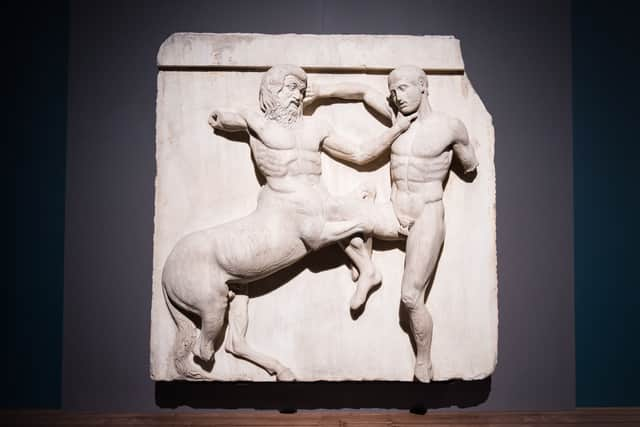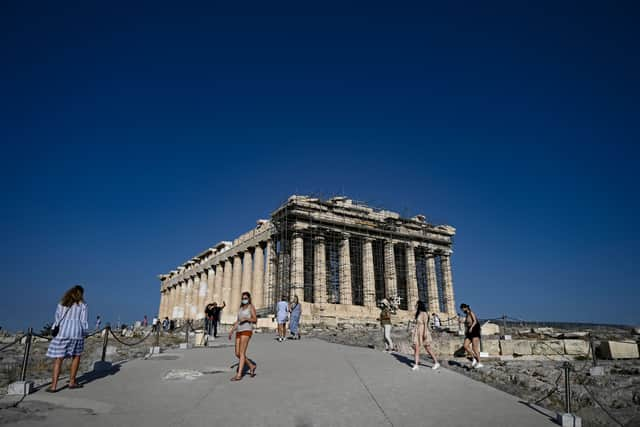What are the Elgin Marbles? Story of Parthenon Marbles, why British Museum has them, and why Greece wants them
and live on Freeview channel 276
Also known as the Parthenon Sculptures, the Elgin Marbles have been a political football between the UK and Greece in recent years.
Indeed, the ancient marble friezes and sculptures came up in a meeting between Prime Minister Boris Johnson and his Greek counterpart Kyriakos Mitsotakis in Downing Street on Tuesday 16 November.
Advertisement
Hide AdAdvertisement
Hide AdBut what are the Elgin Marbles and why is Greece so keen to get them back?
Here’s what you need to know.


What are the Elgin Marbles?
The Elgin Marbles are marble architectural decorations from the Parthenon (also known as the temple of Athena) in Athens.
They date from between 447BC and 432BC.
One of the central aspects of the sculptures is a 75-metre-long section of frieze which depicts the procession of the Panathenaic festival (the commemoration of the birthday of the goddess Athena).
The collection also includes sculpted relief panels depicting the battle between mythical Centaurs and Lapiths, as well as figures of the Greek gods and legendary heroes.
Advertisement
Hide AdAdvertisement
Hide AdHowever, these items are just a fraction of what was originally crafted in ancient Greece.
Around 50% of the marbles are believed to have been lost over the past 2,500 years due to the ravages of time, wars, changes in the use of the Parthenon as well as a large ammunition explosion that ruined the ancient Greek monument when the country was under Ottoman rule in 1687.
Most of what’s left of the marbles is displayed in the British Museum in London.


Why does the British Museum have them?
Greece was controlled by the Ottoman Empire for hundreds of years.
Advertisement
Hide AdAdvertisement
Hide AdLord Elgin - Thomas Bruce - after whom the marbles have been named, was the British ambassador to the Ottoman Empire between 1799 and 1803.
He petitioned the authorities to be able to draw, measure and remove the marbles.
He was granted a permit and removed about half of the sculptures from the ruins of the Parthenon, as well as other objects of interest from other temples and buildings on the Acropolis.
After the marbles had arrived in the UK, the legality of Elgin’s actions was investigated by a Parliamentary Select Committee.
Advertisement
Hide AdAdvertisement
Hide AdHe was deemed to have removed them legally and the marbles were moved to the British Museum by an act of Parliament.


Why does Greece want them to be returned?
The Parthenon, which sits on the Acropolis in the Greek capital, is one of the country’s biggest tourist attractions.
But it has also been a major symbol for the modern nation state of Greece since it gained independence from the Ottoman Empire in 1832.
It means that, alongside their historical value, the marbles carry a major cultural and political meaning to the Greeks.
Advertisement
Hide AdAdvertisement
Hide AdSince 1983, the Greek authorities have requested their return because they believe the marbles were stolen by the UK.


Current Greek Prime Minister Kyriakos Mitsotakis has said they also “belong in the Acropolis Museum” - a key centre for ancient Greek artifacts that was built in 2009 - and has even offered to loan some of Greece’s other historical treasures to the UK should the marbles be returned permanently.
“I am sure that if there was a willingness on the part of the Government to move we could find an arrangement with the British Museum in terms of us sending abroad cultural treasures on loan, which have never left the country,” he said on 13 November.
“Refusing to discuss the topic seems to me, given the context of everything that has been happening in terms of the return of cultural treasures, to be rather an anachronistic approach.
Advertisement
Hide AdAdvertisement
Hide Ad“It would be a fantastic statement by what Boris calls Global Britain if they were to move on this and look at it through a completely different lens.”
Mr Mitsotakis raised the issue with Boris Johnson at their Downing Street meeting.
But while a spokesperson for Mr Johnson said the Prime Minister “understood the strength of feeling of the Greek people on this issue,” he had “reiterated the UK’s longstanding position that this matter is one for the trustees of the British Museum” to the Greek leader.
Boris Johnson, who is known to hold a keen interest in ancient Greece, has previously said he believes the marbles were “legally acquired by Lord Elgin under the appropriate laws of the time”.
Advertisement
Hide AdAdvertisement
Hide AdThe British Museum says on its website that it would consider loaning the marbles back to Greece, but claims it has never received an official loan request.
The UK has come in for major criticism for its retention of the marbles from the EU and more unlikely sources, such as George and Amal Clooney.
In 2014, Amal Clooney advised the Greek government on the issue in her capacity as a lawyer.
Her then-fiancé had previously called for the return of the marbles to Greece while doing publicity for his film The Monuments Men.
A message from the editor:
Advertisement
Hide AdAdvertisement
Hide AdThank you for reading. NationalWorld is a new national news brand, produced by a team of journalists, editors, video producers and designers who live and work across the UK. Find out more about who’s who in the team, and our editorial values. We want to start a community among our readers, so please follow us on Facebook, Twitter and Instagram, and keep the conversation going. You can also sign up to our email newsletters and get a curated selection of our best reads to your inbox every day.
Comment Guidelines
National World encourages reader discussion on our stories. User feedback, insights and back-and-forth exchanges add a rich layer of context to reporting. Please review our Community Guidelines before commenting.
